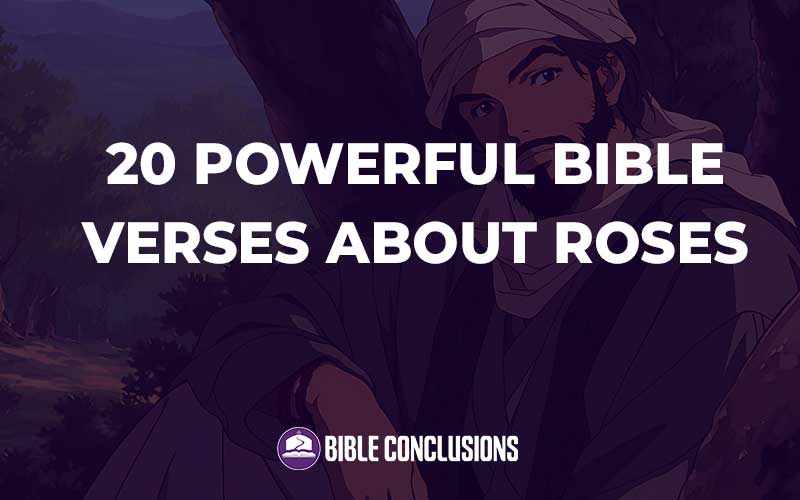The rose, with its delicate beauty and captivating fragrance, has long been a symbol of love, beauty, and affection. While roses are not explicitly mentioned in the Bible, the concept of flowers and their symbolism is prevalent throughout Scripture. Roses, though not specifically named, are often associated with themes of love, joy, and God’s creation. Let’s explore twenty Bible verses that capture the essence of roses and their symbolic significance in the context of love and beauty.
Song of Solomon 2:1 (NIV)
“I am a rose of Sharon, a lily of the valleys.”
Isaiah 35:1 (NIV)
“The desert and the parched land will be glad; the wilderness will rejoice and blossom. Like the crocus,”
Isaiah 35:2 (NIV)
“it will burst into bloom; it will rejoice greatly and shout for joy. The glory of Lebanon will be given to it, the splendor of Carmel and Sharon; they will see the glory of the Lord, the splendor of our God.”
Hosea 14:5 (NIV)
“I will be like the dew to Israel; he will blossom like a lily. Like a cedar of Lebanon he will send down his roots;”
Matthew 6:28-29 (NIV)
“And why do you worry about clothes? See how the flowers of the field grow. They do not labor or spin. Yet I tell you that not even Solomon in all his splendor was dressed like one of these.”
Luke 12:27 (NIV)
“Consider how the wild flowers grow. They do not labor or spin. Yet I tell you, not even Solomon in all his splendor was dressed like one of these.”
James 1:10-11 (NIV)
“But the rich should take pride in their humiliation—since they will pass away like a wild flower. For the sun rises with scorching heat and withers the plant; its blossom falls and its beauty is destroyed. In the same way, the rich will fade away even while they go about their business.”
Psalm 45:13-14 (NIV)
“All glorious is the princess within her chamber; her gown is interwoven with gold. In embroidered garments she is led to the king; her virgin companions follow her— those brought to be with her.”
Isaiah 40:8 (NIV)
“The grass withers and the flowers fall, but the word of our God endures forever.”
Psalm 103:15-16 (NIV)
“The life of mortals is like grass, they flourish like a flower of the field; the wind blows over it and it is gone, and its place remembers it no more.”
Song of Solomon 2:2 (NIV)
“As a lily among thorns, so is my love among the daughters.”
Song of Solomon 2:11-12 (NIV)
“See! The winter is past; the rains are over and gone. Flowers appear on the earth; the season of singing has come, the cooing of doves is heard in our land.”
Song of Solomon 4:5 (NIV)
“Your two breasts are like two fawns, like twin fawns of a gazelle that browse among the lilies.”
Song of Solomon 5:13 (NIV)
“His cheeks are like beds of spice yielding perfume. His lips are like lilies dripping with myrrh.”
Song of Solomon 6:2 (NIV)
“My beloved has gone down to his garden, to the beds of spices, to browse in the gardens and to gather lilies.”
Jeremiah 31:12 (NIV)
“They will come and shout for joy on the heights of Zion; they will rejoice in the bounty of the Lord— the grain, the new wine and the olive oil, the young of the flocks and herds. They will be like a well-watered garden, and they will sorrow no more.”
James 1:17-18 (NIV)
“Every good and perfect gift is from above, coming down from the Father of the heavenly lights, who does not change like shifting shadows. He chose to give us birth through the word of truth, that we might be a kind of firstfruits of all he created.”
Revelation 22:2 (NIV)
“down the middle of the great street of the city. On each side of the river stood the tree of life, bearing twelve crops of fruit, yielding its fruit every month. And the leaves of the tree are for the healing of the nations.”
Revelation 21:21 (NIV)
“The twelve gates were twelve pearls, each gate made of a single pearl. The great street of the city was of gold, as pure as transparent glass.”
1 Peter 1:24-25 (NIV)
“For, ‘All people are like grass, and all their glory is like the flowers of the field; the grass withers and the flowers fall, but the word of the Lord endures forever.’ And this is the word that was preached to you.”
Also Read:

